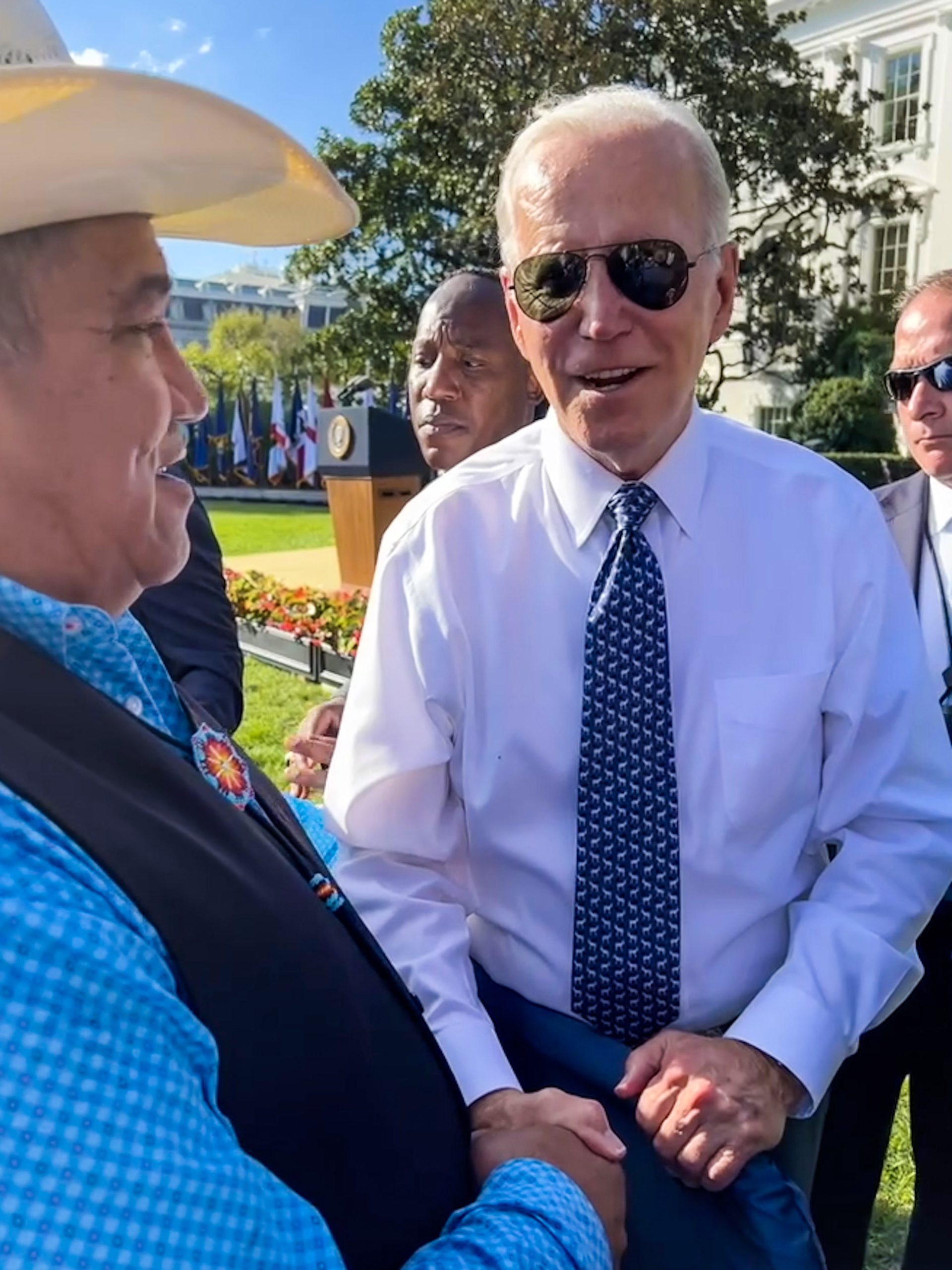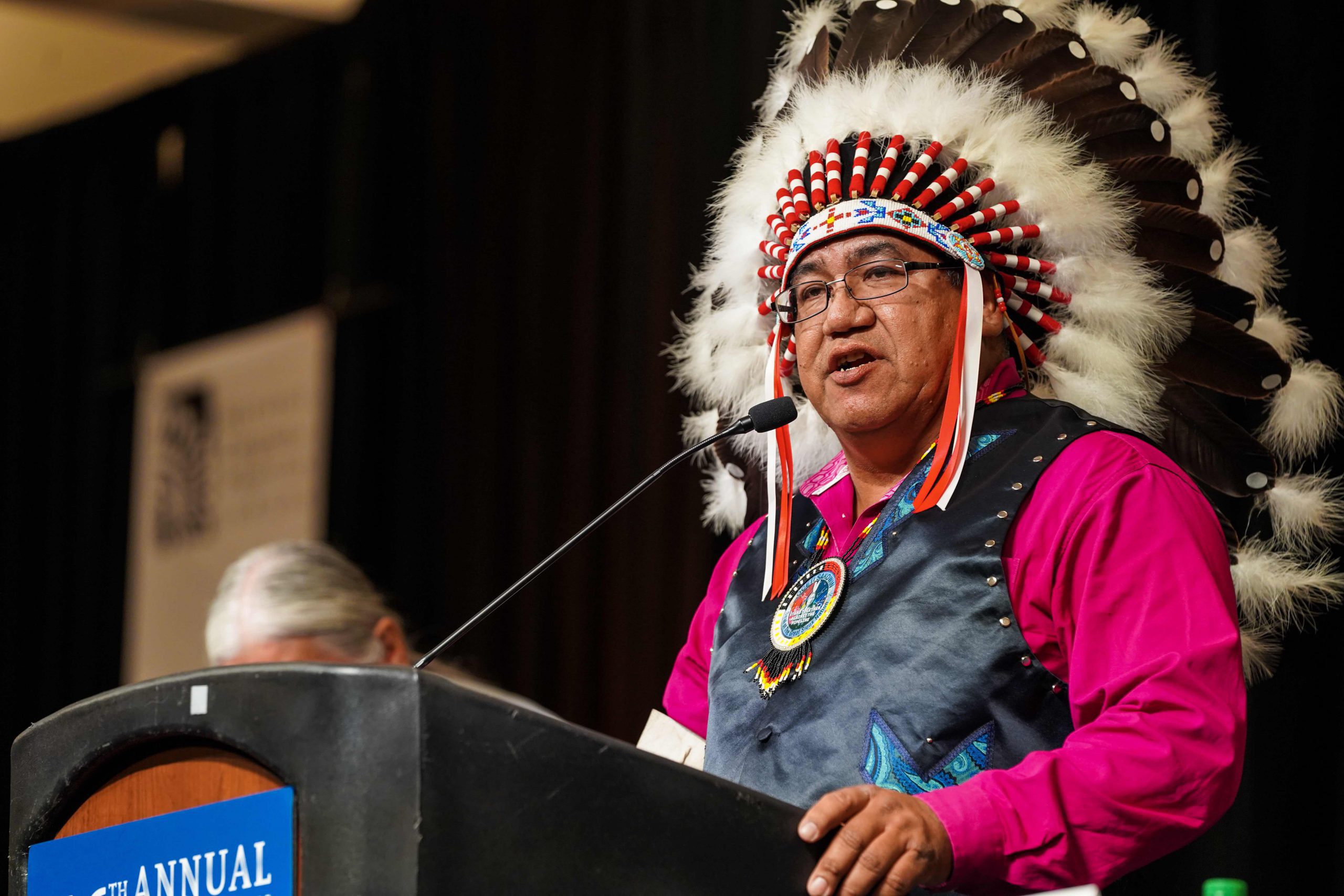Indianz.Com > News > ‘Our policy is nation-to-nation’: Tribes join President Biden for celebration at White House
‘Our policy is nation-to-nation’
Tribes join President Biden for celebration at White House
Wednesday, September 14, 2022
Indianz.Com
WASHINGTON, D.C. — Tribal leaders are looking forward to addressing climate change and improving economic conditions in their communities following the signing of the Inflation Reduction Act into law.
Chairman Harold Frazier of the Cheyenne River Sioux Tribe and President Jonathan Nez of the Navajo Nation were among hundreds of dignitaries who traveled to the White House for a ceremony celebrating the new law on Tuesday. Although President Joe Biden did not specifically mention Indian Country in his remarks about the Inflation Reduction Act, he reaffirmed his administration’s commitment to the trust and treaty obligation as he worked his way though the large crowd on a sunny afternoon in the nation’s capital.
“Chairman,” the president said in greeting Frazier on the South Lawn at the White House, “Our policy is nation-to-nation.”
- $235 million for tribal climate resilience, including fish hatchery operations and maintenance
- $225 million for development of tribal high-efficiency electric home rebate programs
- $150 million for tribal home electrification
- $75 million for the Tribal Energy Loan Guarantee Program, including direct loans to tribes
- $20 billion in allowable loan guarantees under the Tribal Energy Loan Guarantee Program, a ten-fold increase in investments
- $25 million for Native Hawaiian climate resilience
- $12.5 million for tribal emergency drought relief
Related Stories
Search
Filed Under
Tags
More Headlines
PHOTOS: Tunica-Biloxi Tribe celebrates at annual powwow
NAFOA: 5 Things You Need to Know this Week
Chuck Hoskin: Cherokee Nation invests in our community
Native America Calling: Native in the Spotlight with Edgar Blatchford
AUDIO: House hearing on budget request for Bureau of Indian Affairs and Indian Health Service
AUDIO: American Indian & Alaska Native Public Witness Hearing: Day 2, Afternoon Session
Native America Calling: After 30 years, a new challenge to car license sovereignty
AUDIO: American Indian & Alaska Native Public Witness Hearing: Day 2, Morning Session
Native America Calling: The graduation milestone
Native America Calling: The imbalance of parole and probation
Native America Calling:Drive to dismantle college inclusion adds another barrier for Native students
NAFOA: 5 Things You Need to Know this Week
Chuck Hoskin: Cherokee Nation continues to offer opportunities to all
Native America Calling: Illinois’ first Native reservation
AUDIO: The Alyce Spotted Bear and Walter Soboleff Commission’s Report on Native Children
More Headlines
NAFOA: 5 Things You Need to Know this Week
Chuck Hoskin: Cherokee Nation invests in our community
Native America Calling: Native in the Spotlight with Edgar Blatchford
AUDIO: House hearing on budget request for Bureau of Indian Affairs and Indian Health Service
AUDIO: American Indian & Alaska Native Public Witness Hearing: Day 2, Afternoon Session
Native America Calling: After 30 years, a new challenge to car license sovereignty
AUDIO: American Indian & Alaska Native Public Witness Hearing: Day 2, Morning Session
Native America Calling: The graduation milestone
Native America Calling: The imbalance of parole and probation
Native America Calling:Drive to dismantle college inclusion adds another barrier for Native students
NAFOA: 5 Things You Need to Know this Week
Chuck Hoskin: Cherokee Nation continues to offer opportunities to all
Native America Calling: Illinois’ first Native reservation
AUDIO: The Alyce Spotted Bear and Walter Soboleff Commission’s Report on Native Children
More Headlines

